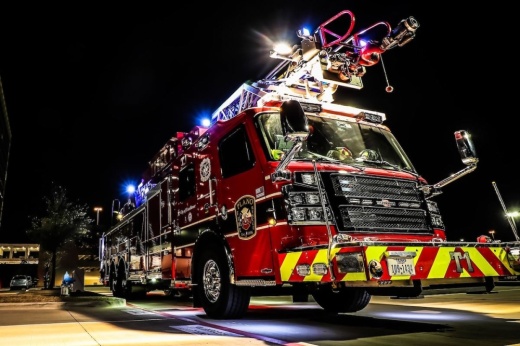The building that houses police department operations was built in 1973, and the latest expansion to personnel space came in 2003, according to city documents. In that time, the police department’s staffing has increased 30%, Police Chief Ed Drain said.
The new 9-acre HQ would be located at the corner of Park Boulevard and Alma Drive. The new building would consolidate personnel located in separate buildings, including the 911 dispatch center.
“The only reason that we have some of those folks in these spaces is because we don’t have space to put them at the police headquarters,” Drain said.
In a nutshell
Proposition D asks voters to approve $37.49 million for improvements to several Plano fire stations, along with the construction of a brand new fire station.
Fire Station 14 would be located next to the new police headquarters at the corner of West Park Boulevard and Alma Drive, in between stations 1 and 2, which Fire Chief Chris Biggerstaff said were “the two busiest stations.”
“It would provide us coverage to keep us from having to bring other apparatus over to cover Station 1 and Station 2,” Biggerstaff said. “We can’t prevent that altogether, but whenever you do that it begins to affect your response times.”
Emergency calls in the city have increased by over 50% since 2014, Biggerstaff added, and Station 14 would have been the city’s sixth busiest in 2022. He also said that area is expected to see additional growth as the Collin Creek mixed-use development continues to develop.
Additionally, the proposal calls for funding for a renovation to Station 8 and a land acquisition to expand Station 3.
Another thing
Proposition A accounts for nearly half of the proposed bond funds, which would allocate money to various street improvements.
Of the $316 million in Proposition A, asphalt overlay projects would account for $130 million, while neighborhood residential street and alley repairs would account for $92.75 million.
Plano’s neighborhood street rehabilitation is done by performing maintenance to all roads and alleys within a set area called a “neighborhood zone,” Director of Public Works Abby Owens said. Plano has 53 neighborhood zones, and Owens said city staff aims to hit each zone every 20-25 years, depending on need.
Within each zone, the work is usually broken up into two projects that cost approximately $5.3 million per project, meaning the bond would pay for construction in eight neighborhood zones.
“When we go to these zones, we will do repairs on all the streets, the alleys and the sidewalks to make sure that we’re meeting the needs of the community in that area,” Owens said.
Other road projects in Proposition A include residential street reconstruction, bridge replacement, intersection improvements, alley reconstruction, sidewalk repairs and more.
What else
Propositions E, F and G are seeking funds for updates to the city’s fleet operations center, improvements at Schimelpfenig Library and various parks projects, respectively.
Owens said that the current facility does not have high enough ceilings to work on larger city vehicles. She added that there is currently not enough storage for the city’s vehicles.
The largest parks and recreation project would be an $11.59 million wholesale renovation of Schell Park, near the corner of Park Boulevard and Jupiter Road.
The city would also spend $10 million of the bond funds on buying land for new city parkland, including in Lavon Farms—which is set to become a mixed-use development as part of Plano’s Envision Oak Point plan.
Additionally, Proposition C would pay for a new police training facility.
Why it matters
The proposed bond originally sat at $700 million, a number council member Rick Horne admitted would be a “tough nut to sell,” to Plano voters.
Budget Director Karen Rhodes-Whitley said that if any proposition fails, it’s “going to have to wait.”
“In 2029, we’ll do another bond referendum, and we would have to bring it back up,” she said.
What’s next
If all propositions passed, the maximum property tax rate increase would be $0.029, according to city documents.
Rhodes-Whitley said the tax rate has only increased once in Plano due to a bond referendum in the last 20 years.
In total, the city currently has $604.73 million of outstanding general obligation bonds and tax notes. Passage of all propositions would add $647.9 million in principal and approximately $291.5 million in interest over a 20-year period.





